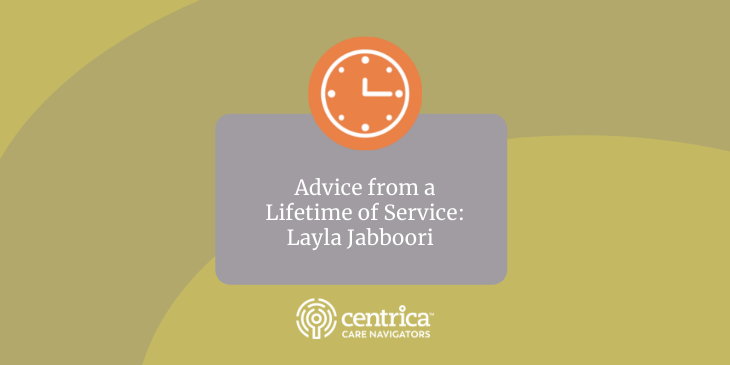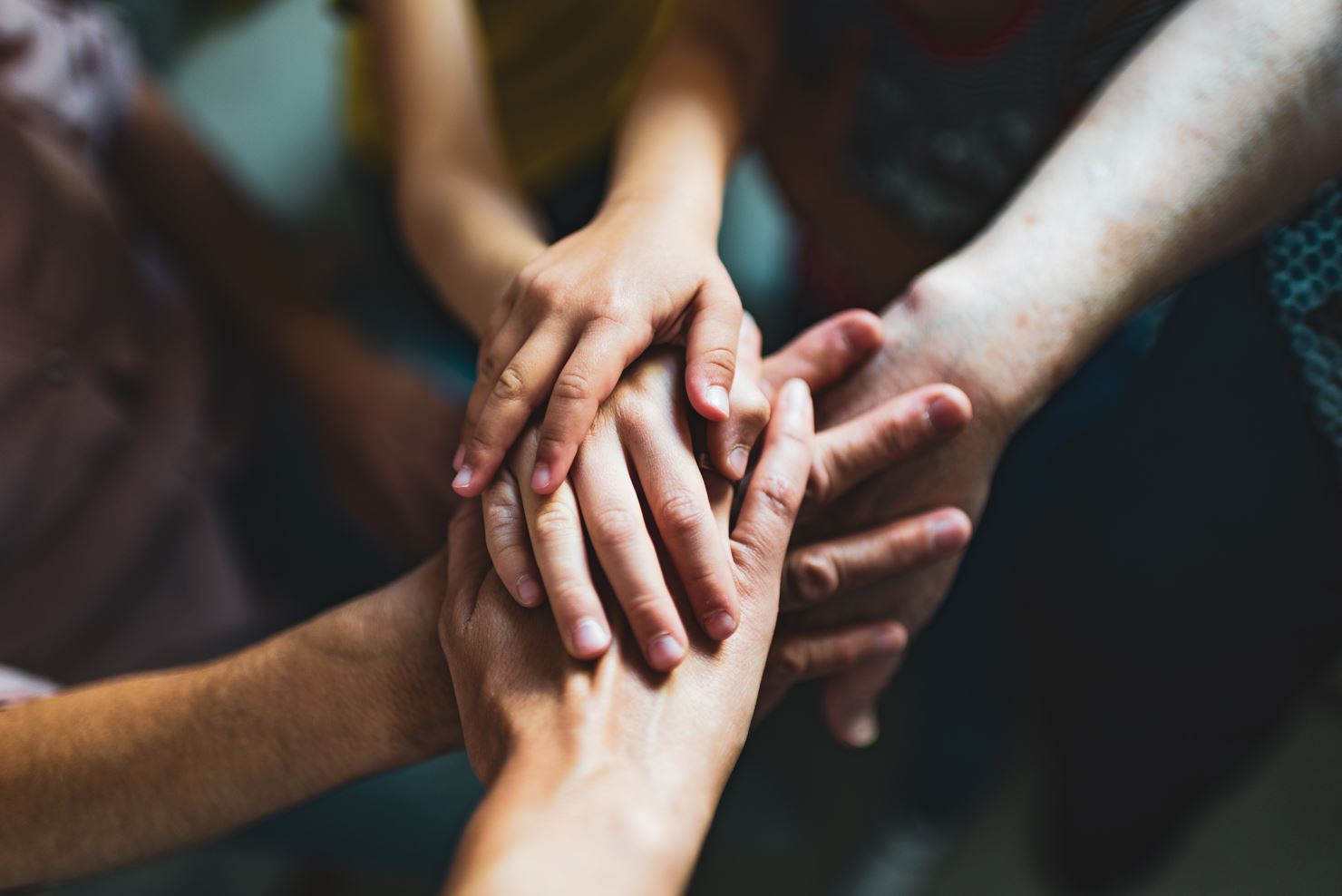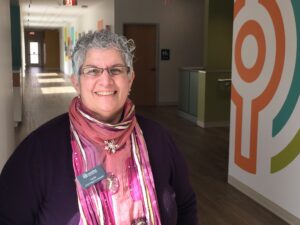
Layla reflects on a lifetime of learning.
Layla Jabboori often uses metaphors as a grief support counselor with Centrica Care Navigators (formerly known as Hospice Care of Southwest Michigan). She uses a pressure cooker to describe the way people who struggle to face the pain of their grief build up stress and anxiety. She compares the need to actively deal with grief to recovery from a broken leg.
Maybe most importantly, she likens her work not to a job, but to a calling.
“It’s the ability to be used in such a way to come alongside a hurting person (and) to help them have hope, to grow, to realize they can have a meaningful life,” Layla says.
Volunteer from the start
Layla has been part of Centrica Care Navigators almost as long as it has been a part of the southwest Michigan community. She was in the second-ever set of volunteers, joining in 1981 with a focus on visiting homecare clients and helping in marketing.
Her volunteer participation was prompted by her experiences in her first job, as a phlebotomist on the oncology unit or in the ICUs at Bronson Hospital. She said she was “uncomfortable with the idea of death” and wanted to break through that discomfort. The volunteer training and experience at hospice gave her more confidence to face those emotionally difficult situations on the job.
Layla earned a master’s degree in counseling and worked with people who had substance use disorders at Gateway Villa, a drug treatment center in Kalamazoo. A friend who was a hospice nurse insisted she interview at hospice care for a grief support position. She already had experience leading grief groups at Gateway. To Layla’s surprise, her interview at what is now Centrica Care Navigators was done with then-CEO Jean Maile, formerly the director of Gateway.
Layla began her full-time work at hospice in August 1994 while moving to part time at Gateway for another seven years. Layla then joined Desert Streams Christian Counseling in Kalamazoo as a private practitioner.
She says she’s always had multiple jobs at the same time, a decision she made initially to put herself through her years as an undergraduate student at Western Michigan University.
She also tries to stay active in several different types of counseling, like her work in grief support as well as with substance users.
“Counseling can be myopic,” she says. “You can easily just focus on your specialty and not broaden your therapeutic skills.”
The grief pressure cooker
A metaphor that Layla turns to is the pressure cooker, comparing it to the emotional pressure that needs to be let out by acknowledging grief. It’s an easy-to-understand symbol; she’s even brought her own pressure cooker from home to grief groups to illustrate her point… though she says at first group members wonder if they’re having a meal with the meeting.
She says there are different kinds of grievers. Intuitive grievers easily express their emotions, perhaps by crying and feeling their feelings deeply. They find it helpful to talk to others to process their grief.
Instrumental grievers make a to-do list of tasks to stay busy, and often experience emotions that are much more muted.
Still other grievers are a mix of those types, or dissonant grievers, who tend to express their emotions one way in public, while feeling the opposite internally. But they all need to express their grief, not keep it to themselves.
“The only way to get through it is to go through it,” Layla says. “If you plug that hole, the pressure will be released somehow.”
She said she’s received calls from people who have lost a loved one but didn’t want to deal with their grief until they had no other choice.
“It seems like it’s always about four months after a death,” she says. “People call saying, ‘I felt like I had a heart attack, or I am crying more than I did initially after the death.’ If you don’t deal with emotional health, you will deal with it physically or in any number of other ways.”
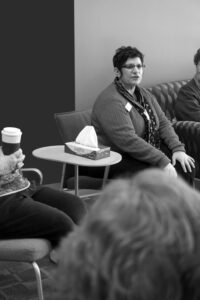
Some grief sessions are with groups in conversation.
Layla most often compares grief to that of being put under anesthesia. While everyone grieves differently, for some grievers, there are feelings of numbness, shock, and denial initially after a death. In this metaphor, as the anesthesia begins to wear off, the patient who has undergone surgery will begin to feel pain related to the surgery.
In the same way, the further a griever gets away from the date of death, the more they recognize the reality of the death. That often leads to increased emotional pain. This can be confusing to the griever since most people have the belief that, as time progresses, they “should start feeling better.”
The old adage that recovery takes time may be true, but there’s more to dealing with grief than just waiting, Layla says. In another of her metaphors, she agrees that a broken leg needs time to repair itself – but it also needs to be set properly, and it needs medical attention. There’s some work needed on the part of the griever that can be done with the help of a grief counselor.
“We all want things to be ‘done,’ but grief doesn’t work that way,” she says.
What Layla has learned
Though technology has advanced in many ways, the fundamentals of care haven’t changed over the years, Layla says. She values making one-on-one connections with people, being able to use what she sees in a person’s body language, eyes, and words to understand how to communicate with them. That’s why the last two years, when so many in-person activities were shut down because of the COVID-19 pandemic, were difficult to negotiate as a counselor.
“Even when you’re looking at them on a tablet, you’re still not looking eye-to-eye,” she says.
She notes that people are uncomfortable talking about death, just as they always have been. Layla encourages people to find safe and healthy ways to express or externalize their emotions, like talking, journaling, poetry, art, music, and movement. She also wants people to know it’s OK to feel sad sometimes.
“Grieving people need that,” she says. “It marks a time of honoring the person. Allowing yourself to step into your pain will help you move through it.”
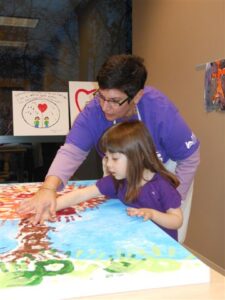
Layla has helped grievers of all ages.
Grief gives survivors an opportunity to think about how they’re feeling, and how they’ve been living their lives, too. Layla says more than once, she’s handed a basic cookbook to a husband who survived his wife, but has never even heated up pot of water on the stove.
Even silence can be helpful for the people she works with. Layla says she often asks open-ended questions, then lets the griever take the time they need to answer.
“(Silence) allows a person to do the internal work, to deal with grief in their own way,” she says.
Time for herself
Layla will mark her last day with Centrica Care Navigators April 15. She’ll continue her part-time private counseling practice, but she’s also excited about having more time for herself.
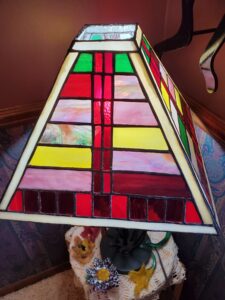
Layla created this stained glass lampshade.
When she’s not at work, she creates stained glass art and many other crafts. She’ll also use art to help adults with developmental disabilities at Shalom Kalamazoo, a care program based in Parchment.
“I’m looking forward to not having to move in the morning,” Layla laughs. “6:00 a.m. is getting earlier and earlier all the time!”
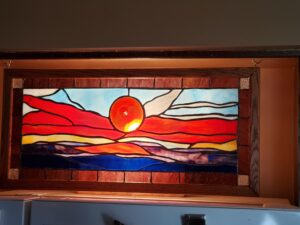
Layla’s artwork is on display in her home.
Words of wisdom
One of the metaphors Layla likes to use with grievers isn’t originally from her. It’s a poem by Terry Kettering called “Elephant in the Room.” In the poem, the narrator wants people to talk about the elephant: “if we talk about his (her) death, perhaps we can talk about his (her) life.”
Layla says facing grief and talking about death is essential to coming to terms with it. An important way to do that is with a grief counselor.
“(The) biggest thing is the gift of showing up, the gift of listening,” she says.
Our Mission is to guide and support individuals and their caregivers coping with illness, aging, dying, and loss by providing compassionate medical, emotional, spiritual, and personal care.
